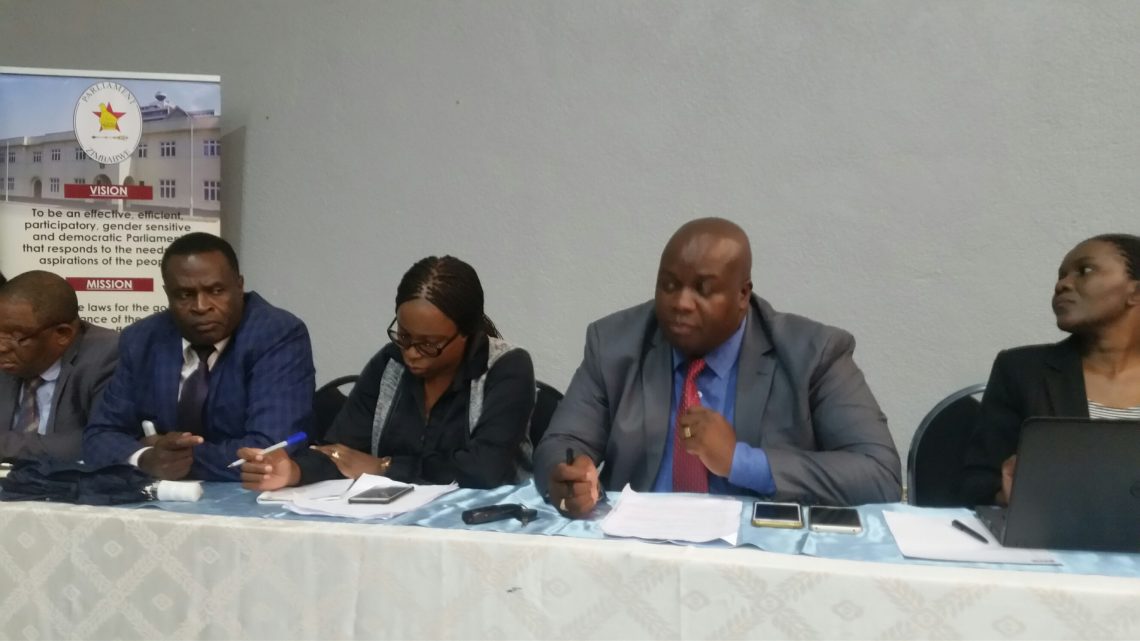By Byron Mutingwende
Stakeholders at a public hearing held by the Parliamentary Portfolio Committee on Transport and Infrastructure at the New Ambassador Hotel in Harare on 13 February 2018 said the Civil Aviation Bill needed amendments on many areas.
In his contribution, Nkosilathi Sibanda, the Chairman of the Commercial and General Aviation Association of Zimbabwe expressed concern over the proposed composition of the Civil Aviation Authority of Zimbabwe (CAAZ) Board.
“The Board’s members, according to Section 10 (2) of the Civil Aviation Act, should be appointed ‘for their knowledge of and ability and experience in aviation or finance or for their suitability otherwise for appointment as members.’ Section 10 (3) says that ‘At least one member shall be appointed for his knowledge of law, in particular the law relating to aviation.’
“The current Board, like all others before it, has almost no members with knowledge of and experience in aviation. The lawyer is not in any way versed in the law relating to aviation,” quipped Sibanda.
He noted the move was in complete disregard of the Supreme Court’s ruling in Marawa v Minister of Transport & Others 2000 (2) ZLR 225 (S), where Ebrahim JA said that “suitability” for appointment must relate to the objects of CAAZ.
“Bearing in mind that one of the objects of CAAZ is to advise the Government on matters relating to domestic and international civil aviation, a Board consisting entirely of persons lacking in knowledge, ability or experience in civil aviation cannot hope to achieve those objects. Not all members of the Board must have knowledge of civil aviation, but the majority should have such knowledge,” Sibanda said.
Currently, no persons have been appointed from the civil aviation industry, which is directly affected by CAAZ’s decisions and actions.
Chris Wilkinson, the Director of Skyline Tandem Company said he invested over $800 000 into his company but was facing bankruptcy due to mismanagement within the aviation sector.
Evans Makuku from the Air Traffic Controllers Association of Zimbabwe called for a separation of the regulator and service providers. The regulator in the current set up is not effectively carrying out its role.
“Safety will be compromised because even now at the Air Traffic Control School there is only one qualified instructor. The quality of communication is poor because they use obsolete radio systems and equipment at the airports. The surveillance equipment was installed in the 90s so there is need for procurement of modern air traffic control systems,” Makuku said.
Caroline Matsotsi, a CAAZ Board Member said there was a need to split pension funds for the regulator and aviation service providers. Gutu Kachambwa, the under-secretary of the Zimbabwe Flight Crew Association also called for improvement of aviation examinations by holding them through online or via computers instead of the manual system used.
On the proposed split of CAAZ, it appeared that it was not clear exactly what functions would remain with CAAZ. At present it has divisions like public relations and marketing, which were not known under whose ambit they would be when split.
The air traffic control and related services division should not belong to the Airports Company, nor should it come under the regulatory authority; it should be a separate entity, noted Sibanda.
It also emerged that CAAZ does not have the expertise to conduct accident investigations.
“It is wrong to provide that CAAZ officials should be seconded to the ministry of transport for this purpose. Further, accident investigation should be entirely independent of the aviation regulator, which could well have a vested interest in the outcome – for example, if the investigation shows regulatory deficiencies, lack of oversight, inadequate airport facilities and so on, these must be revealed,” Sibanda added.
Christopher Chitindi, the Chairman of the Parliamentary Portfolio Committee on Transport said on the 25th of March 2014, Cabinet approved that the Ministry of Transport and Infrastructural Development proceed with the unbundling of the Civil Aviation Authority of Zimbabwe (CAAZ) into two entities, that is, the Airports Management Company of Zimbabwe and the Civil Aviation Authority of Zimbabwe.
The rationale for the unbundling of CAAZ being that: the CAAZ in its current form is performing the dual role of regulator and operator in the aviation sector and this results in the Authority being conflicted in the discharge of its duties as it is both a referee and player; international best practice dictates that there be separation of roles in regulation and operations to ensure that there is effective, efficient and transparent enforcement and monitoring of operations; the current set up has been creating problems in that in the event of aircraft accident or incident, the CAAZ has to conduct the investigations and report to the Minister responsible.
The investigations can be subjected to compromises as CAAZ may find it difficult to attribute negligence to itself; the international aviation industry world-wide is placing major emphasis on safety and security matters hence the independence of the regulator from operators is paramount to avoid regulatory capture; the split will improve performance, efficiency and effectiveness in service delivery and that aviation industry players have supported the split in order to do away with the conflict of interest inherent in an Authority that performs regulatory and operational functions.
In order to arrive at the recommended structure of forming two entities, that is, the Airports Company and the Regulatory Authority, the Ministry was informed by international best practices.
In Kenya and Zambia, two separate entities model consisting Airports Company and the Civil Aviation Authority (Regulator and Air Navigation Services) exist. Ethiopia, Namibia, Botswana and United States of America use a single entity model operating as the Civil Aviation Authority (Airports, Air Navigation Services and Regulator); and South Africa has three separate entities model with Airports Company; Air Navigation Services Company and the Civil Aviation Authority (Regulator).
“The Ministry has taken a conscious decision to set up two entities bearing in mind the level of development of the aviation sector at this stage. It is imperative that we avoid burdening Treasury with state enterprises, which will require bailing out due to the shrunken nature of the industry. Furthermore, the air navigation and air traffic control functions shall remain in the regulatory authority until such time as the industry has grown and is viable to make air navigation and air traffic control a stand alone entity,” Chitindi said.






